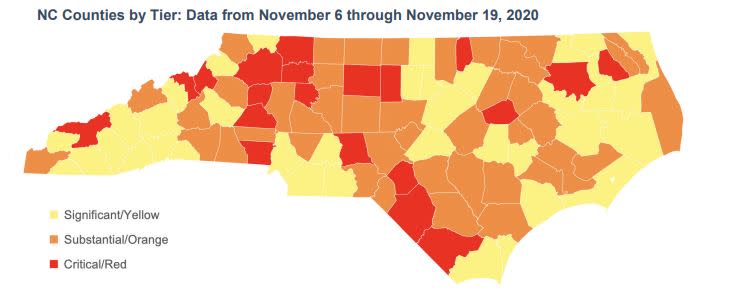Cooper Ratchets Up Mask Mandate In NC With New Executive Order
- Oops!Something went wrong.Please try again later.
CHARLOTTE, NC — Gov. Roy Cooper ratcheted up North Carolina's mask mandate Monday, calling for stricter enforcement of the state's existing face covering requirements and retail store occupancy limitations.
The news comes as the number of "red tier" counties experiencing critical levels of community spread of coronavirus doubled Monday. The number of known coronavirus cases in North Carolina rose by 2,419 cases Monday, and hospitalizations hit a new record high of 1,601 patients, according to North Carolina Department of Health and Human Services data.
"Our statewide mask requirement has been in effect since June, and it is still our best weapon in this fight," Cooper said at a news conference. "Today’s executive order will further tighten that mandate, making it clear that everyone needs to wear a mask whenever you are with someone you don’t live with."
The new executive order, which goes into effect Wednesday, tightens the existing mask order and now requires masks be worn in any public indoor space, including:
In gyms when exercising.
In all restaurants, unless diners are actively eating or drinking.
In all schools, public or private.
On all public and private transportation.
The new order also puts more responsibility on retailers to enforce mask use inside their businesses and to limit occupancy. Stores larger than 15,000 square feet must also designate an employee at the store's entrance who is responsible for ensuring customer mask compliance.
SEE ALSO: How NC Readers Plan To Celebrate Thanksgiving: Survey Results
Under the new executive order, local and state law enforcement, along with local health departments, can enforce the statewide mask mandate. Individuals and businesses who do not comply with the mask order could face a Class 2 misdemeanor penalty, which could lead to a fine of up to $1,000.
"You need to be wearing a mask when you're around anyone who is not in your household. That's the simple bottom line," said state health Secretary Mandy Cohen.
The order is set to expire Dec. 11.
"We don’t want to go backward, but we will if it’s necessary," Cooper said. "The next seven to 14 days will tell us whether we are stemming the tide or whether we need to ratchet it up even more."
SEE ALSO: New County Alert System Unveiled In NC As COVID-19 Cases Rise
Last week, the state health department rolled out a statewide color-coded COVID-19 County Alert System pinpointing viral hot spots around the state. At the time the alert system was unveiled, at least 10 counties in North Carolina had critical community spread of COVID-19.
As of Monday, however, that number increased to 20, Cohen said.
"We are on very shaky ground," she said Monday
All North Carolina counties are experiencing high levels of transmission of the COVID-19 virus, according to top state public health officials, but some are affected more than others. The new alert system will make localized data more accessible, such as case rates and impact on medical resources. Counties will be designated as red, orange or yellow depending on the rate of local spread, based upon three specific metrics:
Case rate: The number of new cases in the last 14 days per 100,000 people.
Percent positive: Percent of tests that are positive over 14 days.
Hospital impact: Percent of COVID-19 hospitalizations, COVID-19-related visits to the emergency department, staffed open hospital beds and critical staffing shortages over 14 days.

The color tiers indicate:
Red — critical community spread
Orange — substantial community spread
Yellow — significant community spread
As of Monday, counties with current red alerts include Alamance, Alexander, Avery, Bertie, Catawba, Columbia, Davie, Gaston, Guilford, Hoke, Mitchell, Montgomery, Perquimans, Robeson, Surrey, Swain, Vance, Wilkes, Wilson and Yadkin.
Orange alerts were issued for 42 counties with substantial community spread. Those counties include Ashe, Bladen, Cabarrus, Caldwell, Camden, Caswell, Chatham, Cherokee, Cleveland, Craven, Cumberland, Dare, Davidson, Duplin, Edgecombe, Forsyth, Granville, Greene, Halifax, Iredell, Johnston, Jones, Lee, Lincoln, Madison, McDowell, Moore, Nash, Northampton, Pamlico, Pasquotank, Pender, Pitt, Randolph, Richmond, Rockingham, Rowan, Rutherford, Sampson, Scotland, Stokes and Warren.
Communities in red and orange counties will be advised to limit mixing between households, minimize the number of people in social circles, reduce public interactions to mainly essential activities, and avoiding settings where people congregate. Businesses in those communities will also be advised to use telework whenever possible, cancel nonessential travel and avoid indoor meetings or events that include more than 10 people.
This article originally appeared on the Charlotte Patch

